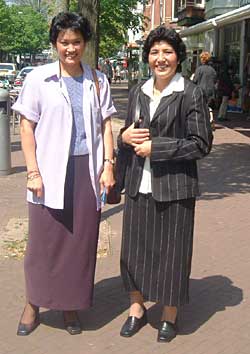 It's been a long journey for Kabita Nirola, who began her career in the Nepal Police directing traffic on New Road back in the 1980's, when women cops were a rarity. "A man came up and whistled at me," she says, laughing. "I arrested him. Drivers would stop to look at me because they had never seen a policewoman." Nirola moved up the ranks to become one of Nepal's four women DSPs. Then, two years ago, she joined the International Criminal Tribunal for the Former Yugoslavia, following in the footsteps of her colleague Rita Pradhan, who in 1994 also left the police force as a DSP to join
It's been a long journey for Kabita Nirola, who began her career in the Nepal Police directing traffic on New Road back in the 1980's, when women cops were a rarity. "A man came up and whistled at me," she says, laughing. "I arrested him. Drivers would stop to look at me because they had never seen a policewoman." Nirola moved up the ranks to become one of Nepal's four women DSPs. Then, two years ago, she joined the International Criminal Tribunal for the Former Yugoslavia, following in the footsteps of her colleague Rita Pradhan, who in 1994 also left the police force as a DSP to join the ICTY.
On a rare sunny day in The Hague, both women hunt for a sidewalk caf?, but these are all occupied by sun-starved Europeans. Eventually they settle on a dark Chinese restaurant and talk about the work they do now. For security reasons, they are not allowed to reveal much about this, however. They both work as Investigators in teams composed of lawyers, military analysts, other police, and translators. They are not allowed to discuss what exactly they are investigating in relation to the former Yugoslavia, and neither can they say where they take their frequent field trips. "It's in the former Yugoslavia, obviously," Kabita offers, but that is as specific as she can be.
These restrictions promise to grind the interview to a halt, but Kabita goes on: "In Nepal, we usually investigated crimes that had just been committed. In the case of the former Yugoslavia, we're investigating crimes that occurred years ago."
Pradhan faced a greater challenge in adjusting to ICTY's work because when she joined in 1995, the organisation was only a year old, and unusure of its own mandate. "Nothing was clearly laid out for us," she says. "But now there's a system in place."
Were they sorry to leave the Nepal Police? Both women nod vigorously. "I spent seventeen years there. That's what trained me," Nirola says. "And obviously my training was good, because I can compete at an international level." Pradhan is just as unequivocal about paying her dues: "We're here today because of the Nepal Police." Yet the discrimination they endured in Nepal still rankles.
Impressively, of the fourteen Nepalis employed at the ICTY, three are women. (The third is a lawyer, Tej Thapa). Both Pradhan and Nirola are glad to be setting an example for the younger women joining the Nepal Police. Having moved up the ranks through sheer effort, they open the way for the following generations.


